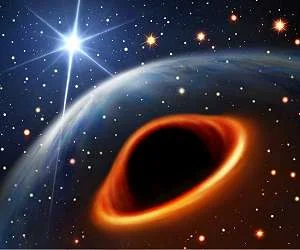
Black Hole Singularities Challenged: Quantum Effects Could Rewrite Physics as We Know It
For decades, the singularity at the heart of black holes has been a thorn in the side of physicists. These points of infinite density, hidden behind the event horizon, seemingly break the very laws of physics. But what if singularities aren't inevitable? A new wave of research is exploring alternative black hole models, suggesting that quantum effects might erase the need for these bizarre entities altogether.
A new paper published in the Journal of Cosmology and Astroparticle Physics, stemming from work at the Institute for Fundamental Physics of the Universe (IFPU) in Trieste, reviews the cutting edge of this fascinating field. It delves into two alternative models, proposes observational tests and investigates how this research could fuel the development of a quantum theory of gravity.

"Hic sunt leones," remarks Stefano Liberati, director of IFPU, using a Latin phrase historically used to mark unexplored and dangerous territories on maps. This perfectly encapsulates the mystery surrounding the singularity – a region where our current understanding of physics crumbles.
The concept of black holes, born from Einstein's theory of general relativity, has always been intertwined with this enigma. While observations like the detection of gravitational waves and images from the Event Horizon Telescope (EHT) have solidified the existence of these cosmic giants, they haven't provided any definitive insights into the nature of singularities.
Liberati emphasizes that we can only describe black hole physics up to a certain point. Beyond that lies an "unknowable territory," which is unacceptable for science.
Researchers are now seeking a new paradigm where the singularity is "healed" by quantum effects, leading to models of black holes without singularities. This paper emerged from a collaborative effort at an IFPU workshop, uniting theorists and phenomenologists to debate and synthesize ideas. According to Liberati, the paper's value lies in the discourse itself, with participants sometimes shifting their perspectives during the sessions.
The workshop outlined three main models: classic black holes with singularities and event horizons, regular black holes that ditch the singularity but keep the horizon, and black hole mimickers, which lack both. The paper details how these alternatives might form, transform, and how future observations could distinguish them from their standard counterparts.
While current observations only scratch the surface, Liberati believes that subtle differences in the external behavior of mimickers or regular black holes could offer indirect evidence. He notes, "Regular black holes, and especially mimickers, are never exactly identical to standard black holes...even outside the horizon."
Future high-resolution imaging by the Event Horizon Telescope could reveal details in the light bent around these objects, while gravitational wave measurements could detect subtle anomalies. Even thermal emissions from horizonless mimickers could provide clues.
While current knowledge is insufficient to perfectly predict these subtle deviations, advances in theory and numerical simulations expected in the coming years will pave the way for new observational tools tailored for alternative models.
Ultimately, this research aims to bridge the gap between general relativity and quantum mechanics, potentially leading to a quantum theory of gravity. "What lies ahead for gravity research is a truly exciting time," Liberati concludes. "We are entering an era where a vast and unexplored landscape is opening up before us."
This is an ongoing area of research but the potential impacts on how we understand our universe is immeasurable. What potential implications do you think we will see if the singularity is disproven? Let us know your thoughts in the comment section below.